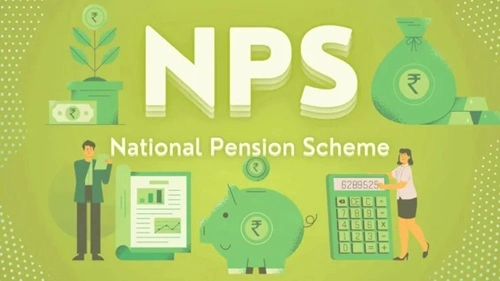The National Pension System (NPS) is a retirement savings scheme started by the Government of India. It helps people build a pension fund for their old age. Both employees and employers (in the case of government jobs) contribute a fixed amount regularly to the account.
But many people are confused and ask — how much does the government actually contribute to NPS? Let’s understand this clearly.
Quick Summary

| Category | Government Contribution in NPS |
| Central Govt. Employees | 14% of Basic Salary + DA |
| State Govt. Employees | 10% earlier → Mostly 14% now |
| Private Sector Employees | No government contribution |
| Self-employed | No government contribution |
| Tax Benefit | Employer’s 14% contribution is tax-deductible under Section 80CCD(2) |
Government Contribution to NPS for Government Employees
If you are a Central or State Government employee, the government acts as your employer and contributes to your NPS account.
- Earlier, the government used to contribute 10% of your Basic Salary + Dearness Allowance (DA).
- Now, this has been increased to 14% of Basic + DA for Central Government employees.
- Most State Governments have also increased their contribution to 14%.
So, in simple words:
✅ Government contribution = 14% of Basic Salary + DA
This contribution is directly deposited into your NPS Tier-I account along with your own contribution.
How Much Does the Employee Contribute?
- Government employees usually contribute 10% of their Basic + DA from their salary every month.
- This amount is matched by the government (14% now) and deposited into NPS.
Example:
If your Basic + DA is ₹50,000 per month:
- Your contribution (10%) = ₹5,000
- Government contribution (14%) = ₹7,000
Do Private Sector Employees Get Government Contribution?
No. If you work in the private sector or are self-employed, the government does not contribute to your NPS account.
For such individuals:
- Only the individual or the employer (private company) contributes.
- The government does not put money into your account.
So:
❌ No direct government contribution for private individuals.
✅ Only government employees get 14% employer contribution.
Tax Benefits on Government Contribution
The government’s contribution to a government employee’s NPS account is also eligible for tax benefits under Section 80CCD(2) of the Income Tax Act.
- Tax deduction is available on employer’s contribution (government) up to 14% of Basic + DA.
- This benefit is over and above the ₹1.5 lakh limit of Section 80C.
Why Government Contribution is Important?
- It helps in building a larger retirement fund.
- Since both employee and employer contribute, the pension wealth grows faster.
- Your money gets invested in equity, government bonds, and corporate debt, managed by professional pension fund managers.
In simple terms:
- If you are a government employee, the government contributes 14% of your salary (Basic + DA) to your NPS account.
- If you are a private employee or individual, the government does not contribute — you have to invest yourself.
- NPS is one of the safest and most beneficial retirement plans, especially for government workers.